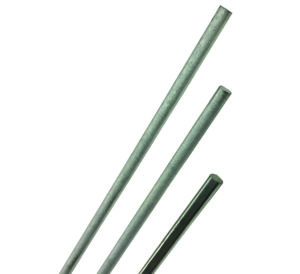6000T
Alloy Type: SPECIALTY ELECTRODES , FILLERS, & GOUGING

How to use Blue Demon 6000T…in 3 easy steps!!
- Clean the surface with a stainless steel brush
- Heat the base metal surface, not the 6000T
- Apply the 6000T to the heated surface
**If using Oxy AC, use a neutral flame-Keep flame in motion-Do not plunge into water-Cool Slowly**
Clean aluminum down to bare metal, getting off all dirt, paint and coatings. Cleanliness is essential for a strong permanent joint. In this case “clean” means metallurgically uncontaminated with ions or free electrons.
This very thin layer of aluminum oxide is what must be removed. When you puncture this layer it breaks up into a fine powder and floats to the surface of the puddle. You can actually see it appear on the surface. Draw the abrading tool through the puddle several times to remove oxides and promote fusion with the base metal. A few strokes are usually enough-.004 to .005 deep gives a maximum strength.
Get rid of the oxides barrier by going down through the molten coating and abrading the oxides away. A thin layer of insoluble oxide begins to form on the surface even before you lay the brush down. As the base metal is heated, oxides form even more quickly but become stretched under tension. The oxide must be removed or penetration will not occur.
Localizing of heat techniques can also be utilized to improve the shape of the fillets. If you are joining two pieces of different sizes you will want to apply most of the heat to the larger piece so that they both arrive at the working temperature at about the same time.
A short stub can be fused to a new rod with the torch flame if you control temperatures carefully. The repair will harden in a few seconds and can be worked immediately. Do not immerse in water to speed the cooling. The material will be quite hard. It will grind, machine, drill, tap and paint much like a mild steel. Yet when fused with aluminum it is not brittle unless it is cooled too quickly.
For most jobs, an LP gas torch is enough. Make sure to reach 730⁰F. Use the general purpose tip. For heavy pieces you will need a fuel-oxygen torch. If so, use a large tip with a neutral flame to spread the heat evenly. Only heat with the middle or outer cones of the flame.
T-Joints: Heat the parts, not the 6000T and flow the 6000T into the intersection. Run the solid end of the 6000T stick through the molten 6000T to remove any trapped oxide.
Butt Joints: If the ends are beveled at 45⁰ angles clean the surfaces and then heat separately. After cooling, brush both pieces again to remove the oxide layer that has formed. Reheat both parts equally and fill in the groove with 6000T. Cool slowly by fanning the hot weld with your propane torch as you gradually move away.
Lap Joints: Parts can be tinned and slid together while 6000T is molten, or a generous fillet of 6000T can be applied around the edges of the lap joint.
Metered Joints: Make sure material is solidly clamped in place. A neutral flame is applied over the joint area until 6000T melts along the joint. The joint may be built up and finished as desired.
Stripped Threads: Drill old threads out oversized so when filled with 6000T all drilling and taping will be done with the same material making it easier to work with. After drilling, heat base metal from the bottom of the hole beginning at the bottom and working your way up. Fill the hole, let cool, drill as needed.